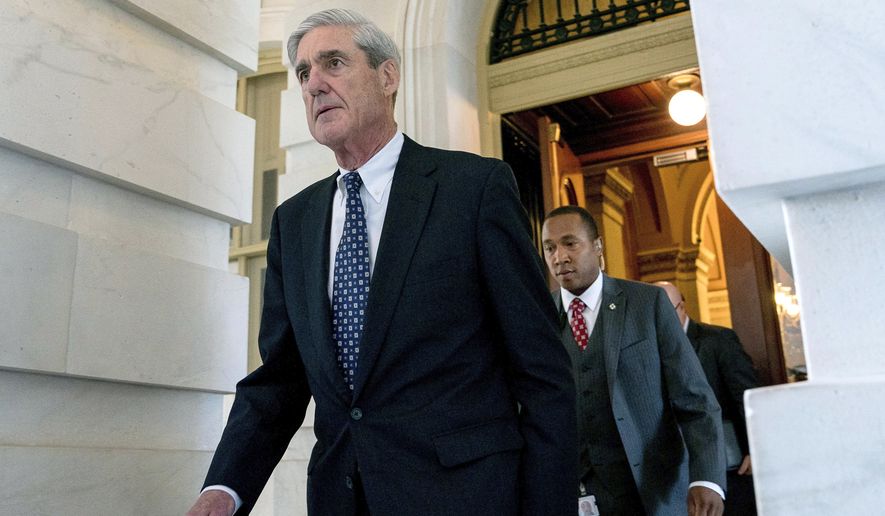The Christopher Steele dossier allegation that an “extensive conspiracy” existed between the Donald Trump campaign and the Kremlin wasn’t borne out in the special counsel’s first charges of Russian election interference.
Special counsel Robert Mueller brought a grand jury indictment against 13 Russians for interfering in the election via social media posts, false American identities and fake political groups. The indictment and Deputy Attorney General Rod Rosenstein said no Americans knowingly took part.
Written by ex-British spy Steele and financed by the Democratic Party, the dossier has permeated the FBI and the Democrats’ investigations into possible Trump-Russia collusion.
A July 2016 Steele memo quotes a Russian source as saying there was evidence of an “extensive conspiracy between campaign team and Kremlin, sanctioned at highest levels and involving Russian diplomatic staff based in the US.”
The dossier went on to say that an ethnic Russian associate of Mr. Trump told a Steele “compatriot” that “there was a well-developed conspiracy of co-operation between them and the Russian leadership.”
This conspiracy, Mr. Steele wrote, was run by former campaign manager Paul Manafort who used volunteer adviser Carter Page as an intermediary.
SEE ALSO: Mueller indictments: Feds charge 13 Russians with meddling in 2016 election
Mr. Manafort has repeatedly denied Mr. Steele’s charges. So has Mr. Page, who calls the dossier fiction and smear job. He has been interviewed by the FBI and has sworn under oath to Congress that the charges are baseless.
Mr. Rosenstein on Friday explained to reporters the elaborate information war network run in St. Petersburg by a front company Internet Research Agency. Unleashed in 2014, the social media operations ran ads and stage rallies, mostly in support of Republican Donald Trump and against Democrat Hillary Clinton.
The Russians disguised their true identities, posing as Americans to appear just like any politically active citizen.
“Now, there is no allegation in this indictment that any American was a knowing participant in this illegal activity,” Mr. Rosenstein said. “There is no allegation in the indictment that the charged conduct altered the outcome of the 2016 election.”
The indictment talks of a limited number unnamed Trump supporters having unwitting contact with some operatives.
Said Mr. Rosenstein, “Again, there’s no allegation in this indictment that any American had any knowledge. And the nature of the scheme was the defendants took extraordinary steps to make it appear that they were ordinary American political activists, even going so far as to base their activities on a virtual private network here in the United States so, if anybody traced it back to that first jump, they appeared to be Americans.”
The indictment quotes the accused Russians’ private conversations, a sure sign they were wiretapped. If Trump people had knowingly collaborated, such collusion would most likely have turned up during months of electronic surveillance.
Russian President Vladimir Putin and his allies in recent years have turned to information cyberwarfare to try to create uncertainty and chaos in Western democracies in the U.S. and in Europe.
The Mueller indictment provides a comprehensive look at one such operation.
But there were others, including the much-publicized hacking of Democratic Party computers and the theft and exposure of thousands of emails, some of them politically embarrassing to the Clinton campaign.
The Mueller indictment did not touch on the hacking, which the U.S. intelligence community said were executed by Russian intelligence with Mr. Putin’s knowledge.
Because Mr. Mueller has now indicted Russians on charges of exploiting social media and U.S. laws, it can be expected that he will also bring charges in the hacking crimes.
The Steele dossier makes the sensational charge that the Russians were hacking with the “full knowledge and support of Trump and senior members of his campaign team.”
There has been no public evidence to confirm this, and Mr. Trump and his associates dismiss the dossier as untrue.
Mr. Steele was paid by Fusion GPS, which got the money from the Hillary Clinton campaign and the Democrat Party via a D.C. law firm.
An investigation by Rep. Devin Nunes, California Republican and chairman of the House Permanent Select Committee on Intelligence, revealed that the FBI used the Steele dossier to convince a court to authorize a yearlong wiretap on Mr. Page. The FBI application cited a Yahoo News Story as validation, yet it came from the same source — Mr. Steele.
Republicans say that if there was Russian collusion in 2016, it was carried out by the Clinton campaign and Mr. Steele and his Kremlin sources.
• Rowan Scarborough can be reached at rscarborough@washingtontimes.com.




Please read our comment policy before commenting.